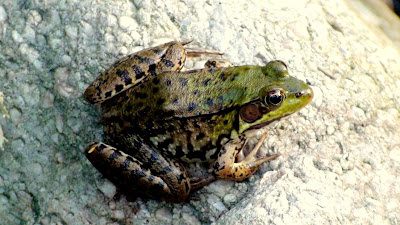 |
| 3 of 4 new beaver kits chew on willow leaves with their mother in the background |
Following the disastrous dam rupture at our main beaver
Pond, our beaver colony moved downstream to a practically invisible and
inaccessible pond, aptly named Secret Pond. Ever since, I have been trying to
ascertain the health of the colony and it has proved to be somewhat of a
challenge. In short, I have not been able to confirm the presence of several of
the adults including May Apple –the colony’s patriarch. In my last post on this
subject (dated June 24th), I was convinced that I had seen him
working on one of the new dams, and I even captioned one of the pictures with
his name, but I’ve since concluded that I had actually seen Blueberry, May
Apple’s 2-yr old son, who resembles him
in many respects.
As I mentioned in that previous post, the disaster had brought
the season’s new beaver kits out of the lodge a little prematurely. I now know
that there are a total of 4 new kits. They are quite small, but they are clearly
eating solid food and are well adept at diving through the lodge’s underwater
tunnels. In fact, the youngsters enjoy a large degree of independence around 2
ponds where they play, explore and generally harass each other and their adult
kinfolk.
The beavers’ work at Secret Pond and at 3rd Pond
has managed to bring the water levels up to respectable levels. Through dam
building and dredging, the deep water areas have been expanded at the 2 ponds,
thus enabling the beavers to more easily transport their construction materials
to where they are needed. Also, the entrances to the 3rd
Pond’s lodge are now submerged, which will make it much harder for intruders to
enter.
Much of the other pond dwelling wildlife have now moved from
the upstream disaster zone to the newly restored ponds. Ducks, fish, frogs, dragonflies
and even Whirligig Beetles are all in residence now. The more closed in and
shaded complexion of Secret Pond attracts shyer species. Songbirds like
Tanagers, Towhee and Thrasher sometimes sing from branches at the water’s edge.
Veery, Kingbird and Baltimore Oriole also call while hunting for the insects –many
of which are also attracted by the water.
The nature experience at the bank of this pond is a quite intimate
one. While sitting on the shore, it is easy to be completely immersed in
the activities of the wildlife –the beavers are right there –only a few feet
away. The birds sometimes fly right in front of my face and even occasionally
attempt to land on me. Damselflies actually do land on my legs, and I often
have a Green Frog sitting beside me as I scribble down notes on the beavers.
 |
| Mother Julia comes on shore to chew on some greens |
 |
| Julia and Blueberry engage in mutual grooming --it's a beaver thing to do |
 |
| The lodge at 3rd Pond is now occupied, if not exactly fixed up |
Meanwhile, a portion of the impressive crater that was once
our largest beaver pond has already begun to turn green with plant sprouts.
Grass seeds as well as a variety of other plant seeds that have lain dormant in
the mud are taking advantage of this opportunity to grow. If the beavers
continue to leave this pond’s dam in disrepair, this pond basin will quickly
transform into a beaver meadow. The rich silt that collected at the bottom of
the pond facilitates a fantastic growth rate of plants; so within a month, a lush
meadow will be growing were beavers once swam.
 |
| A beaver kit reaches out for an Aspen leaf |





I am really enjoying this well written and very informative blog - thank you!
ReplyDeleteGreat update, thanks for posting! Our patriarch has been known to 'disappear' for a while, some reports say that they are actually keeping tabs on possible suitable habitat in case the family needs to relocate one day. Love to watch the 'pushmatch' tussel with new kits. http://www.youtube.com/watch?v=6Fde1PIucS4
ReplyDeleteHeidi Perryman, Ph.D.
Worth A Dam
www.martinezbeavers.org
Over the years, I too have recorded instances of colony patriarchs leaving the territory for extended periods. If that's what our May Apple did, all I can say is that he picked a fine time to leave -with the dams all demolished, the lodge left uninhabitable and 4 hungry kits! Oh yes, and a crop of willow in the field. Somebody could write a country song about it!
ReplyDelete